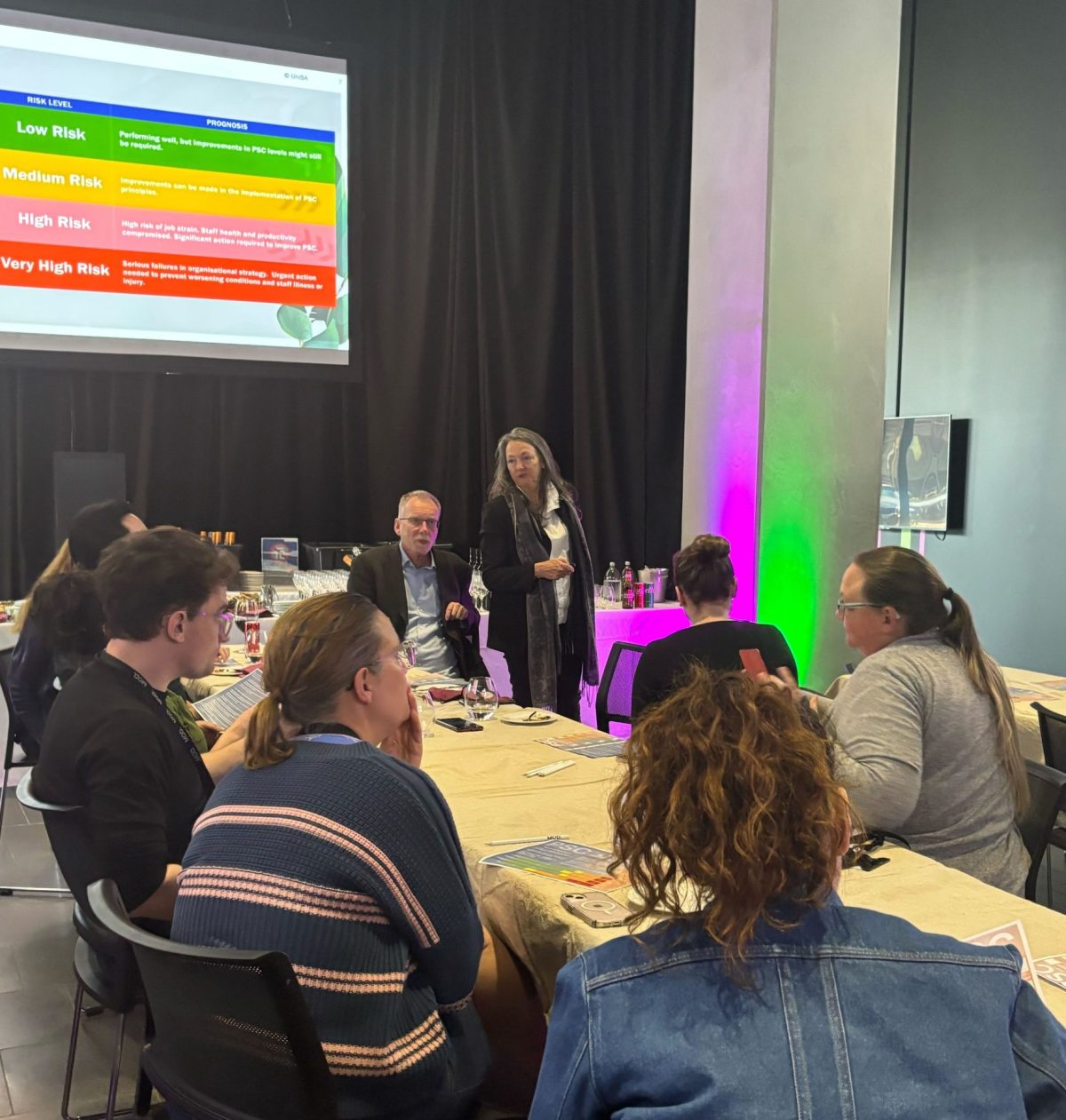Posted 30 Oct

Ethos: the ethics of health and safety in the workplace
How do we know if we are thriving or merely surviving at work? Ethos hosted its final event for 2024 by exploring the ethics of health and safety in the workplace. Ethos Community of Practice aims to foster a culture of ethical questioning amongst researchers and the public.
Led by ARC Laureate Professor Maureen Dollard, participants completed a Psychosocial Safety Climate (PSC) questionnaire. This tool’s score gives an insight into the environment and climate of safety individuals experiences in their workplace – such as the risk levels of stress and burnout resulting from high job demands and low resourcing.
This activity provided provocations for discussion around the ethics of workplace health and safety between participants and Professor Maureen Dollard, Dr. Rachael Potter, Professor Kurt Lushington, hosted by Dr Debbie Devis. Participants discussed questions around how we measure workplace health and safety and who bears responsibility for a workplace’s psychosocial safety environment. Additionally, they considered ideas around fairness, competing priorities and how safety looks in different types of work.

Many organisations use Employee Assistant Programs (EAPs) to offer psychological help to employees suffering from stress or burnout. While useful, one participant said this is often just “a referral and then that’s it”. Maureen noted this can seem just a reactive intervention of “sending people there to get fixed” after they are already in distress.
Conversely, Maureen said that the Psychosocial Safety Climate model (PSC) “looks further up the tree” to find the workplace causes of worker distress. For example, organisational restructuring may increase uncertainty around worker roles, leading to greater risk of psychological stress. This increased psychological health risk may be counteracted early through fair task distribution and “change consultation” with workers.
The PSC model measures worker perceptions of management’s commitment to and prioritising of workplace health and safety measures. It also looks at the organisational communication and worker participation in such measures. Maureen referenced a longitudinal study that found workers in organisations with high risk (or low PSC) had a “three fold increase” in the risk of developing psychological health symptoms within one year. This predictive power illustrates that organisations can address workplace health and safety risks early by looking at “the environment rather than the reaction”.
Rachael observed that both workers and management are responsible for workplace safety under Australian law. Nonetheless, Maureen noted that senior management are the ones with the power to provide or withhold resources and support. They also have a responsibility to uphold “productivity and profits” in most organisations.
So, how does senior management balance productivity priorities with more humanitarian needs? Maureen posited that we have to “develop economic arguments as to why it’s a good idea to have a strong psychosocial safety climate”, as well as ethical ones. For example, improving this climate can increase productivity by reducing sickness absence and staff turnover.
Alternatively, we often see HR as the department responsible for workplace health and safety. However, one participant noted that HR can merely be “policy police” and disconnected from how an organisation actually operates. Additionally, their primary role is to support management. Therefore, they may not be best placed to have primary responsibility over workplace health and safety.
Rachael concluded that improving the psychosocial safety climate requires a “collaborative approach” between parties, where management provide support for HR, unions, and workers to implement psychologically safe work environment practices.
Rachael referenced the “ideal worker theory”, where the worker (usually a man) “is solely there to serve the company” with few other responsibilities. This notion is outdated, as the modern workforce consists of many people with outside demands (often women), including carer responsibilities or children. Accordingly, participants discussed how working from home and flexible hours can increase worker wellbeing in today’s work environment.
Conversely, Kurt commented that this can blur work-life boundaries. People may feel pressured to work from home instead of taking sick leave, or find themselves working long hours. Another participant observed that working from home can bring up questions around fairness within an organisation. For example, is it fair for some professionals to be allowed to work from home, while the receptionist cannot due to the nature of their job?
Participants also considered how people value different things in their work. Some said they highly value autonomy at work, even if it means carrying a higher mental load. Contrastingly, another participant said that their supermarket teammates were some of the happiest in their jobs because they understood “their purpose and their function, and they clock out” and can leave it behind.
This illustrates that, while management commitment to an ethical psychosocial safe climate is consistently important, this environment may not be expressed in the same way at every workplace.
The Ethos Community of Practice is made possible with funding through the Deputy Vice-Chancellor of Research and Enterprise. The previous Ethos forum investigated the ethics around Indigenous IP. We hold Ethos events regularly at MOD. Check out our events page for more details!
Samuel Wearne was the rapporteur for this forum and is a moderator at MOD.